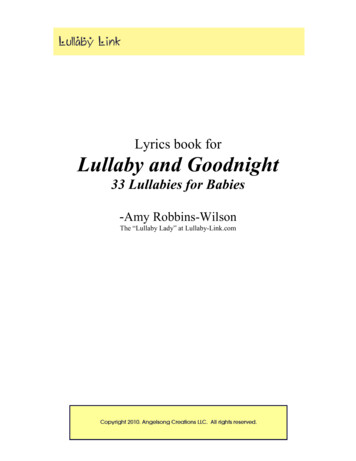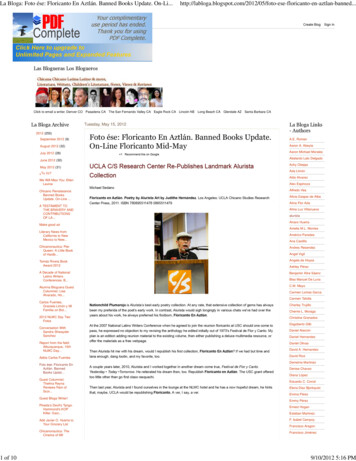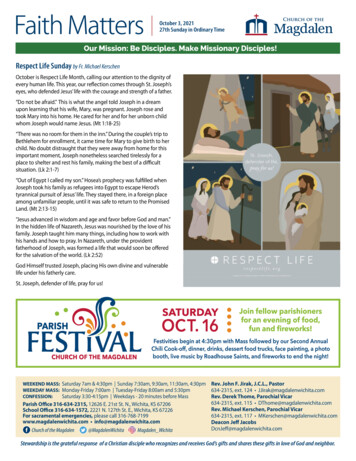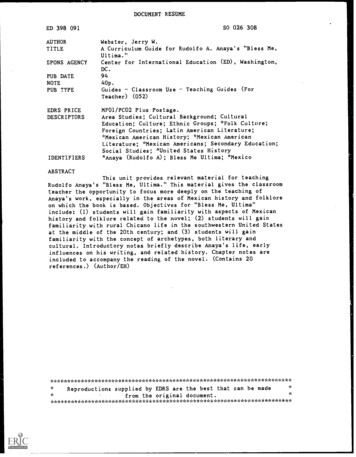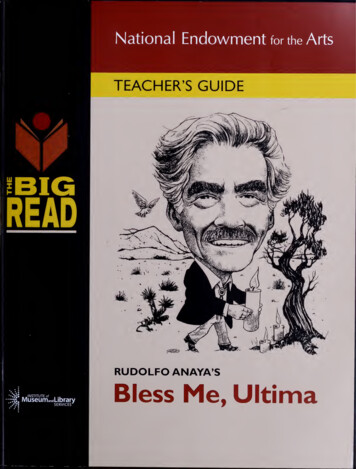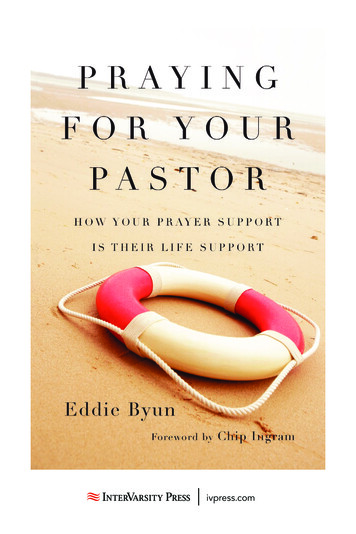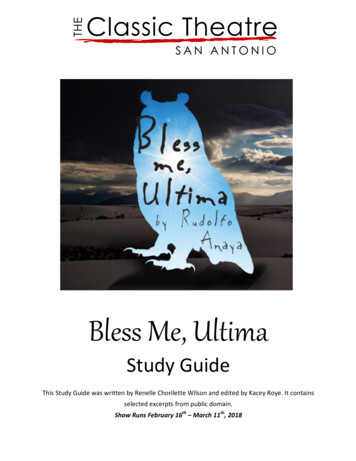
Transcription
Bless Me, UltimaStudy GuideThis Study Guide was written by Renelle Chorilette Wilson and edited by Kacey Roye. It containsselected excerpts from public domain.Show Runs February 16th – March 11th, 2018
Table of ContentsPAGESECTION3About Bless Me, Ultima5Bless Me, Ultima Cast & Production Crew6Synopsis7About the Playwright8Facts About Bless Me, Ultima9Analysis of Major Themes10Vocabulary11Pre-Play Activities13Post-Play Activities14Theatre Etiquette15Free Student Programs at The Classic TheatreMISSION: The Classic Theatre creates excellent theatre that is relevant, diverse, entertaining,and transformative.VISION: We seek to achieve our mission by creating connections and conversations throughcompelling classic works.Classic Theatre StaffKelly RoushKacey RoyeFlorence BuntenRita Duggan, Zach Lewis, Eva LaporteExecutive & Artistic DirectorDirector of EducationBox Office ManagerHouse ManagersThe Classic Theatre–- Bless Me, Ultima Study Guide 2
About Bless Me, Ultima"What I've wanted to do is compose the Chicano worldview — the synthesis that shows our truemestizo identity — and clarify it for my community and myself. Writing for me is a way ofknowledge, and what I find illuminates my life."-Rudolfo Alfonso AnayaAlthough Bless Me, Ultima (1972) was Anaya's first published novel and the one that gainedhim international acclaim as a writer, it was not his first novel. His previously written novels didnot see print. During the mid-1960s, he wrote prodigiously, expressing his life and hisexperiences through poetry, short stories, and novels. For Anaya, writing became an expressionof freedom. Seeing his people around him "in chains," he revolted against that world. Breakingthose chains was important; his characters would not be enslaved. He realized that if he couldwrite about his experiences and his family, using the town where he grew up as a setting, hecould focus on these early years and create a sense of being liberated. Bless Me, Ultima wasbegun as a story about Antonio, but it was Ultima who made the story click. Through Ultima,Anaya explored the subconscious world, that world below the surface of experience thatcontains his culture's collective images, symbols, and dreams. In this subconscious world, Anayaexamines the cultural forces that shaped the lives of Nuevo Méjicanos and Nuevo Méjicanas inthe 1930s and 1940s. Through Ultima and the subconscious world, Anaya exposes the dark sideof brujería and raises questions about good, evil, and truth.-Martinez, Ruben O.“I made strength from everything that had happened to me,” writes Rudolfo Anaya in his 1972novel Bless Me, Última, “so that in the end even the final tragedy could not defeat me. And thatis what Última tried to teach me, that the tragic consequences of life can be overcome by themagical strength that resides in the human heart.”It is this same strength that underlies Anaya’s classic work of Chicano literature, making it sucha compelling and transformative piece.Its genesis did not come easily. Anaya, who grew up in Santa Rosa, New Mexico with a vaquero(rancher) father and a mother raised among farmers, began writing the book in 1963 when hewas a high school English teacher. Though now considered the frontrunner of its genre, BlessMe, Última’s publication proved a challenge because of the novel’s free commingling of theEnglish and Spanish languages, as well as traditional Catholic and native healer (“curandera”)lore. Seamlessly, Anaya weaves together the sacred and the profane to masterful effect.The Classic Theatre–- Bless Me, Ultima Study Guide 3
And yet, the powerful story took years to write and still longer to find a publisher.Nor has its legacy gone unchallenged: In 2010, Arizona passed House Bill 2281, banningliterature "designed primarily for pupils of a particular ethnic group," effectively banning ethnicstudies altogether. Among the books challenged? Bless Me, Última. Last August, of course, afederal judge declared House Bill 2281 “racially discriminatory,” and Anaya’s work is safe. Fornow.The battle that has raged for years about the text in the Tucson Unified School District is astriking analogue for Última’s story: Bless Me, Última, much like Última herself, has beenmartyred, misappropriated, and misunderstood over the years, a victim of its own Otherness.Última – much like her eponymous story – does not fit neatly into any one category. Herinclusive worldview disquiets all those who would trade in exclusivity. She represents, as shereminds Tony, “all that is good and strong and beautiful," drawing from multiple sources butthe same wellspring.Ultimately, Última does not discriminate. Whatever the geographical region, faith tradition, orethnic background from which you hail, this stage adaptation of Bless Me, Última will challengeand change you, as it has challenged and changed us. In the play, we see the triumph of thehuman spirit – of all that is good and strong and beautiful – over all that threatens to assail it.“It is because good is always stronger than evil. Always remember that, Antonio. The smallestbit of good can stand against all the powers of evil in the world and it will emerge triumphant."Donna ProvencherM.A., English Literature and DramaThe Catholic University of AmericaThe Classic Theatre–- Bless Me, Ultima Study Guide 4
Bless Me, Ultima Cast & Production CrewCast of CharactersCarlos AlvaradoNarratorAndrew TreviñoTonyMarisa VarelaÚltimaLuis García, Jr.GabrielAnna de LunaMaríaRicardo GuzmanPrudencioJulio Alberto SepulvedaBella L. VillarrealSpencer OldhamIvanOrtegaAmanda Ireta-Goede KeliRosa CabunocAlyx Irene GonzálezEnsembleProduction StaffJose Ruben De LeonDirectorCameron BeesleyTechnical DirectorDiane MaloneCostume DesignerRick MaloneSound DesignerRic SlocumSet DesignerAlfy ValdezProps Master/Lighting DesignerMatt ShaversMaster ElectricianThe Classic Theatre–- Bless Me, Ultima Study Guide 5
SynopsisThe story begins with Ultima, a curandera, or folk healer, going to live with the Márezfamily during the summer that Antonio is six years old. Antonio is preoccupied with and anxiousabout attending school and having to be separated from his mother. Related to these concernsis his engrossment with knowing his destiny. This concern is exacerbated by his mother's desirethat he become a priest to a community of farmers, where her family lives. At the same time,Antonio is concerned about realizing the wandering desire that stems from his paternal lineage.Antonio is nearly at the point of starting religious study for his first holy communion andis becoming concerned with good and evil in the world. Early in the story, he witnesses thekilling of Lupito, a war veteran, and fears that his father may be punished by God for being withthe men who killed Lupito. Antonio is deeply concerned about the fate of Lupito's soul.As the play develops, Antonio's fears and concerns intensify and become woventogether as he struggles to understand the events surrounding his life. He becomespreoccupied with questions about his destiny, life and death, and good and evil. Ultima conveysan indigenous viewpoint to him that provides guidance when he loses confidence in parentalviewpoints and the teachings of the Church. Ultima tells him the stories and legends of hisancestors, and he comes to understand how the history of his people stirs his blood. Throughher, Antonio learns the "old ways" and develops a new relationship with nature. Thisrelationship opens him to the contemplation of the possibility of other gods.Antonio learns there are powers in the world that differ from those honored by theCatholic faith. He helps Ultima perform a healing that saves the life of his Uncle Lucas, who hadbeen bewitched by the Trementina sisters. Later, he witnesses another healing performed byUltima and begins to understand the world differently; he learns to overcome his fears,especially his fear of change. In the end, Antonio understands himself and the world aroundhim better, and he learns to accept life and the many challenges that it presents.The Classic Theatre–- Bless Me, Ultima Study Guide 6
About the PlaywrightRudolfo Alfonso Anaya was born onOctober 30, 1937, to Rafaelita and Martin Anaya inPastura, New Mexico, a small village located on thewestern edge of the Llano Estacado (the StakedPlains). He was the eighth of ten children (three ofthem from previous marriages by his parents).Rudolfo was born into a generation of MexicanAmerican families that experienced the culminationof the displacement of an agro-pastoral, selfsubsistence economy by a wage-labor marketeconomy. His father tended to withdraw from thisprocess, while his mother, a devout Catholic,encouraged Rudolfo to explore, adapt, and achievein the enveloping social world of the AngloAmerican. Early in his life, his family moved fromPastura to Santa Rosa, where he spent his years as aboy. In 1952, Rudolfo's family moved toRudolfo Alfonso AnayaAlbuquerque, New Mexico. Already a teenager,Rudolfo found the city exciting and adapted quickly. Barrio life in the Barelas section of the cityswept him into the fold of the urban life of Chicano/as. In 1954, a swimming accident leftRudolfo temporarily paralyzed and gave him time and cause to consider many philosophicalquestions about life and human existence.Rudolfo graduated from high school in 1956 and enrolled later that year at a localbusiness school. Unfulfilled by the study of business, he enrolled at the University of NewMexico to study English. There, he discovered the importance of literature as a means forexpressing ideas. During his student years, he was influenced not only by his teachers but alsoby the counterculture of the beatniks, especially by their anti-establishment poetry. In 1963, hereceived his Bachelor of Arts degree in English and began to teach at an elementary school in LaJolla, a neighborhood in southern Albuquerque. Anaya enjoyed teaching and went on to teachat secondary school levels. His interest in literature remained strong, however, and heeventually returned to the University of New Mexico for further study. In 1968, he received aMaster of Arts degree in literature, and he returned later and earned another Master of Artsdegree, this one in guidance and counseling. Between 1971 and 1973, he served as the Directorof Counseling at the University of Albuquerque.The Classic Theatre–- Bless Me, Ultima Study Guide 7
Did You Know?Facts about Bless Me, Ultimaà Bless Me, Ultima was origninaly a novel! It hasbecome the most widely read and criticallyacclaimed novel in the Chicano literary canon sinceits first publication in 1972.à Bless Me, Ultima is Anaya's best known work andwas awarded the prestigious Premio Quinto Sol. In2008, it was one of 12 classic American novelsselected for The Big Read, a community-readingprogram sponsored by the National Endowment forthe Arts, and in 2009, it was the selected novel ofthe United States Academic Decathlon.à Bless Me, Ultima is the first in a trilogy followedby the publication of Heart of Aztlan (1976) andThe original novel coverTortuga (1979). With the publication of his novel,Alburquerque (1992), Anaya was proclaimed a front-runner by Newsweek in"what is better called not the new multicultural writing, but the newAmerican writing.”à It took Anaya six years to create Bless Me Ultima and an additional twoyears to find a publisher.à A film version of thebook was produced in2013.A still from the 2013movieThe Classic Theatre–- Bless Me, Ultima Study Guide 8
Analysis of Major ThemesComing of AgeBless Me, Ultima chronicles Antonio's loss of innocence andhis growth from boy to man. It just happens to Antoniomuch earlier in life than it does to most. But what'sinteresting here is not the fact that Antonio grows up, buthow he grows up. It's definitely not in your typical fashion.Instead of dealing with first kisses and drivers ed, Antoniowrestles with philosophical questions that have plagued theoldest of men for ages. So while he comes of age here, it'sclear he was already wise beyond his years.Moral IndependenceUltima acts as Antonio’s guide as he learns the importanceof moral independence. Ultima teaches him that the mostdifficult questions about life can never be answered entirelyby a single religion or cultural tradition. Antonio hasquestions about evil, forgiveness, truth, and the soul,questions he can answer only for himself. Antonio oncebelieved that the Communion ritual would answer all hisquestions, but Ultima teaches him that he must think forhimself and arrive at his own conclusions.The Influence of Culture on IdentityBless Me, Ultima explores the difficulty of reconcilingconflicting cultural traditions. In the end, Anaya suggeststhat a person can draw from several cultural traditions toforge a more complex and adaptable identity. Antonio is soeager to find a single, definitive answer to the questions thathaunt him because he has been influenced by manyconflicting cultures. Anaya uses these conflicts to explore theinfluence of culture on identity. Many characters in the bookare limited by their cultural prejudices and never learn tolook beyond their own assumptions. Ultima teaches Antonioto avoid the limitations inherent in abiding by one culture,one religion, or one creed. Instead, Ultima encouragesAntonio to embrace all of the cultural influences in his life tobecome a better person.The Classic Theatre–- Bless Me, Ultima Study Guide 9
Vocabulary Exorcise: expel through adjuration or prayers Barrage: the heavy fire of artillery to saturate an area Catechism: an elementary book summarizing the principles of a religion Exuberant: unrestrained, especially with regard to feeling Fertility: the property of producing vigorous and luxuriant growth Conquistador: an adventurer Sacrament: a formal religious ceremony conferring a specific grace Limbo: in Catholicism, the place of unbaptized or innocent souls Interminable: tiresomely long, seemingly without end Jeer: laugh at with contempt and derision Purgatory: a temporary state of the dead in Roman Catholic theology Inquisitor: a questioner who is excessively harsh Knell: the sound of a bell rung slowly to announce death Rheumatism: any painful disorder of the joints or muscles Labyrinth: complex system of paths in which it is easy to get lost Slake: satisfy; as thirst Spendthrift: person who spends money carelessly Heresy: a belief that rejects the unorthodox tenets of a religion Genuflect: bend the knees and bow before a religious superior or image Emaciated: very thin especially from disease or hunger or coldThe Classic Theatre–- Bless Me, Ultima Study Guide 10
Pre-Play ActivitiesReality TelevisionIn order to encourage students to think about the choices a playwright must make whencreating a play with “the look and feel of real life,” ask students to develop a new reality T.V.show. Explain to students, however, that unlike the current television offerings, these realityshows must actually attempt to appear “real.” Like the realistic dramatists of the 19th and 20thcenturies, students must discard lofty or overblown theatrics and storylines in exchange for theactual and the “everyday.” Their characters must be unable to arrive easily at answers to theirpredicaments. Students or teams must create a proposal for their show that answers thefollowing questions: 1. On what everyday situation or dilemma will your show focus? 2. Whateveryday characters will your show include? 3. What physical or philosophical problems of dailyliving, either social, philosophical, or psychological, will your show examine?Identity and Culture Walkabout SurveyTo activate prior knowledge and connections to the play’s themes, have students perform asurvey. Using a survey question that generates thought, provide students with a nine block (3 X3) handout ready for responses. On the left side of the blocks going down, create blanks forthree “Informers.” On the top of the blocks going left to right, create blanks for “Detail #1,”“Detail #2,” and “Detail #3.” Students then walk around and ask three different “Informers” toanswer the survey question, giving three facts each. Students record their Informers’ facts inthe blocks. After returning to their seats, students summarize in writing what they have learnedfrom their classmates. Sample questions to generate a walkabout survey for A Doll’s Houseinclude: How can one describe identity? How can culture affect identity? What does it mean to have independence? What is the definition of growth? Can society's perceptions have an effect on one's identity? Can parent's perceptions have an effect on one's identity?The Classic Theatre–- Bless Me, Ultima Study Guide 11
Practical ActivityTheatrical Styles, MAGICAL REALSIM V. REALISM1. Split your students into two groups and give both groups a scenario.2. Allocate both groups one of the theatrical styles of either Magical Realism,or Realism. Ask them to devise a short scene in that particular style to presentto the rest of the class.3. Share the scenes with the rest of the class. See if the rest of the class canpoint out the differences between the two different styles.The Classic Theatre–- Bless Me, Ultima Study Guide 12
Post-Play ActivitiesNow that students have seen/read the entire play, they can return to the text for a deeperunderstanding of its significant themes. The following topics and questions can be used forwhole class and small group discussion or as essay topics. How did Ultima feel about plants, the river, and other parts of nature? What does itreveal about Antonio that he was so attracted to this view of the world? How would you characterize Antonio's own religious beliefs in Bless Me, Ultima? How does Rudolfo Anaya show Antonio's loss of faith in Bless Me, Ultima? What are the most important lessons Antonio seems to learn throughout the story? How did Rudolfo Anaya use setting in Bless Me, Ultima to construct both a 'magical'sense of the world for the reader? How is identity shown? How is faith shown?The Classic Theatre–- Bless Me, Ultima Study Guide 13
Theatre EtiquetteGoing to a play is a special experience, one that you will remember for a long time. Everyone inthe audience has been looking forward to seeing the performance. A production team puts inmany long hours and a lot of hard work to mount a performance for an audience. If you keep inmind common courtesy for the performers as well as your fellow audience members,everyone’s theatre experience will be optimized. What follows are a few reminders forattending the theatre.1. Plan to arrive at the theatre thirty minutes before theperformance begins.2. Gum, food, drinks, or candy are never allowed in the theatre.You may, however, bring a water bottle.3. Please go to the bathroom before seating for theperformance or at intermission.4. TURN OFF ALL CELL PHONES or anything else that can disturbthe production, actors, and audience members during theperformance. It is very impolite to have your phone go offduring the show.5. Lights will dim just before a performance and then go dark. Acknowledge this by sittingquietly and calmly.6. Do not talk or whisper during the performance. The actors on stage can hear you, which iswhy you can hear them so well. Laughter is of course permissible at appropriate times.7. Keep body movements to a minimum. You can't get up and move around during theperformance.8. No taking of pictures or video recording is allowed.9. Don't leave your seat until the cast has taken their curtaincall at the end.10. Show your appreciation by clapping. The actors love tohear applause. This shows how much you enjoyed theperformance!The Classic Theatre–- Bless Me, Ultima Study Guide 14
Free Student Programs at The Classic TheatreThe Classic Theatre–- Bless Me, Ultima Study Guide 15
The Classic Theatre–- Bless Me, Ultima Study Guide 16
The Classic Theatre–- Bless Me, Ultima Study Guide 3 About Bless Me, Ultima "What I've wanted to do is compose the Chicano worldview — the synthesis that shows our true mestizo identity — and clarify it for my community and myself. Writing for me is a way of knowledge, an
